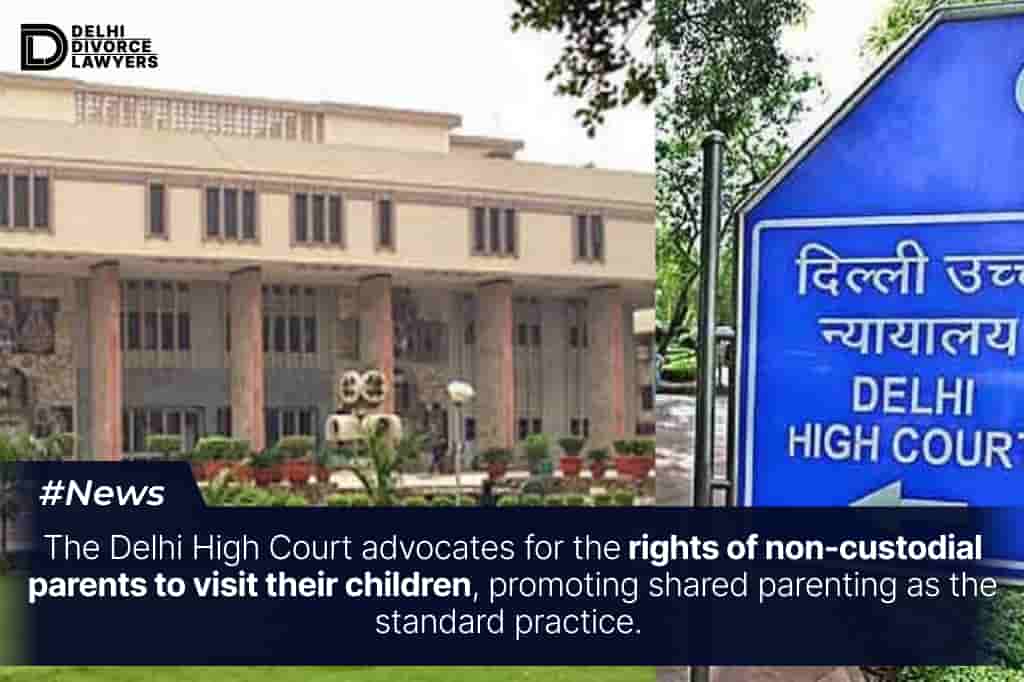The Delhi High Court ruled that in custody disputes, non-custodial parents should have visitation rights to maintain their relationship with their children. Emphasizing the importance of shared parenting as the standard practice, the Court underscored that decisions regarding custody must prioritize the child’s welfare.
Justices Rajiv Shakdher and Amit Bansal of the Division Bench reviewed an appeal where a father sought temporary custody of his 8-year-old son for upcoming festivals, challenging a Family Court ruling that denied his request. The Family Court’s decision was based on the child’s discomfort with the father, fearing emotional distress if temporary custody was granted.
The Family Court permitted the father to visit his son twice a month in the Children’s Room at Dwarka Courts, under counselor supervision. The High Court upheld this decision despite the father’s appeal.
The father argued that the presence of his wife in the Children’s Room influenced the child’s behavior, contributing to his reluctance to meet. He asserted that temporary custody was necessary to address their strained relationship due to prolonged separation.
The Court reiterated that in custody disputes, the child’s best interests are paramount. It affirmed that even non-custodial parents have the right to visitation to ensure ongoing contact and the nurturing influence of both parents.
“It is a settled position of law that in matters of custody of a minor child, the Court has to look into the best interest of the child. The best interest of the child has to be determined taking into account all relevant circumstances. It cannot also be disputed that a minor child requires the love and affection of both his parents. Therefore, even if the custody of the child is with one parent, the other parent must have visitation rights so as to ensure that the child maintains contact with the other parent. Joint parenting is the norm. If the court moves away from this norm, it should clearly articulate its reasons.”
For granting visitation rights, the Court noted that it may require inputs from experts to determine the manner of visitation. It remarked “One of the facets of joint parenting is the grant of visitation rights. At times, the courts need inputs from domain experts. The timing, duration and whether oversight of say a child counsellor is required during visitation by a non-custodial parent, is a call that the court has to take bearing in mind the best interest of the child.”
In this case, the High Court reviewed a report by the Family Court Counsellor detailing the child’s hesitation and anxiety during meetings with the appellant. Despite the counsellor’s efforts, the child remained unresponsive and emotional.
To gain further understanding, the High Court sought advice from another counsellor. This subsequent report emphasized the child’s unease with meeting the appellant and attending court regularly. It recommended an extensive evaluation period of 8 to 12 weeks, during which physical or virtual contact between the child and their father should be suspended. The report also raised concerns about the appellant’s threatening behavior in response to dissatisfaction with the counsellor’s methods.
Due to the counsellor’s report and keeping in mind the tender age of the child, the Court observed that it would not be in the best interest of the child to grant interim custody to the appellant. It stated “These kinds of interactions can be worthwhile and fruitful only if the child is able to overcome his deep apprehensions in meeting the appellant. In our view, perhaps some more time is required for the child to be comfortable in the presence of his father and interact with him.”
The Court acknowledged that as per the Family Court’s directive, affirmed by the Coordinate Bench, the appellant could visit his son twice a month under counselor supervision at Dwarka Court.

